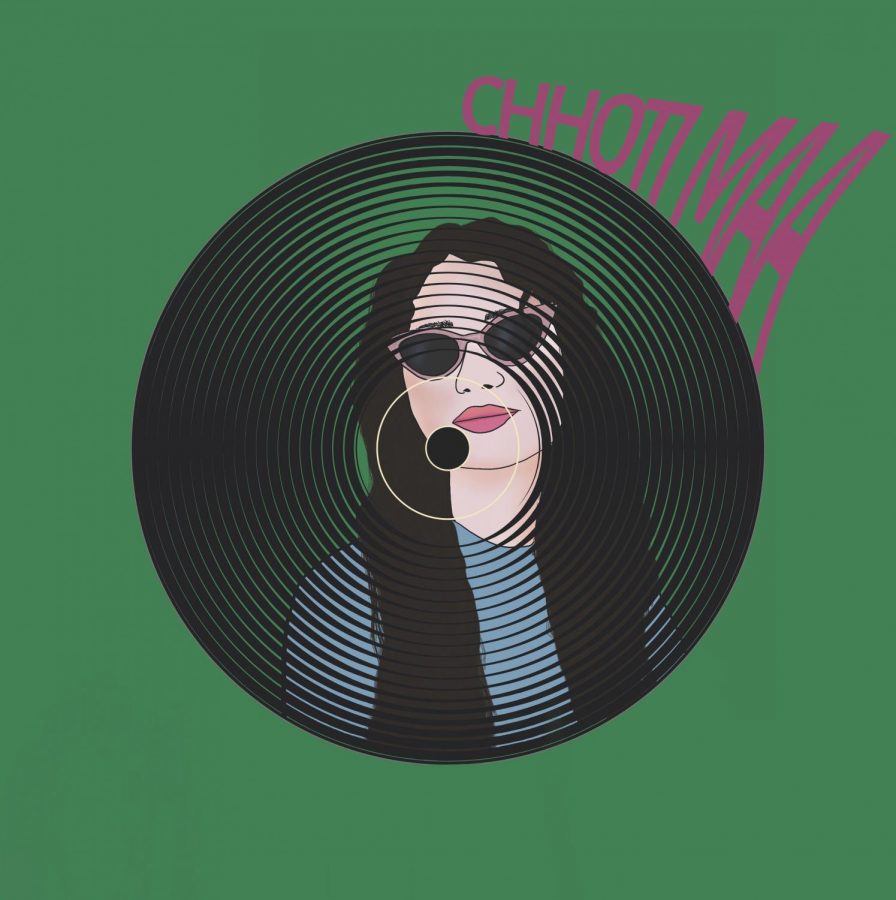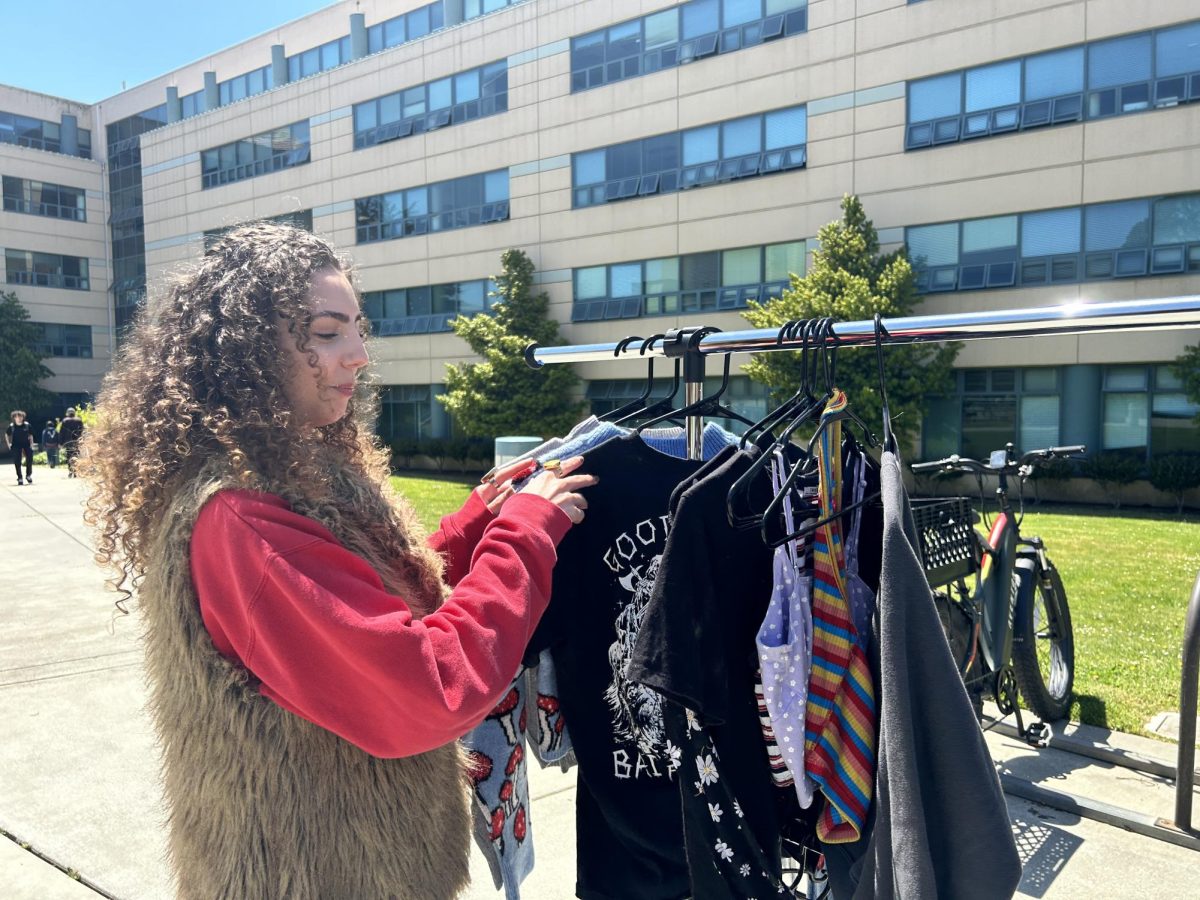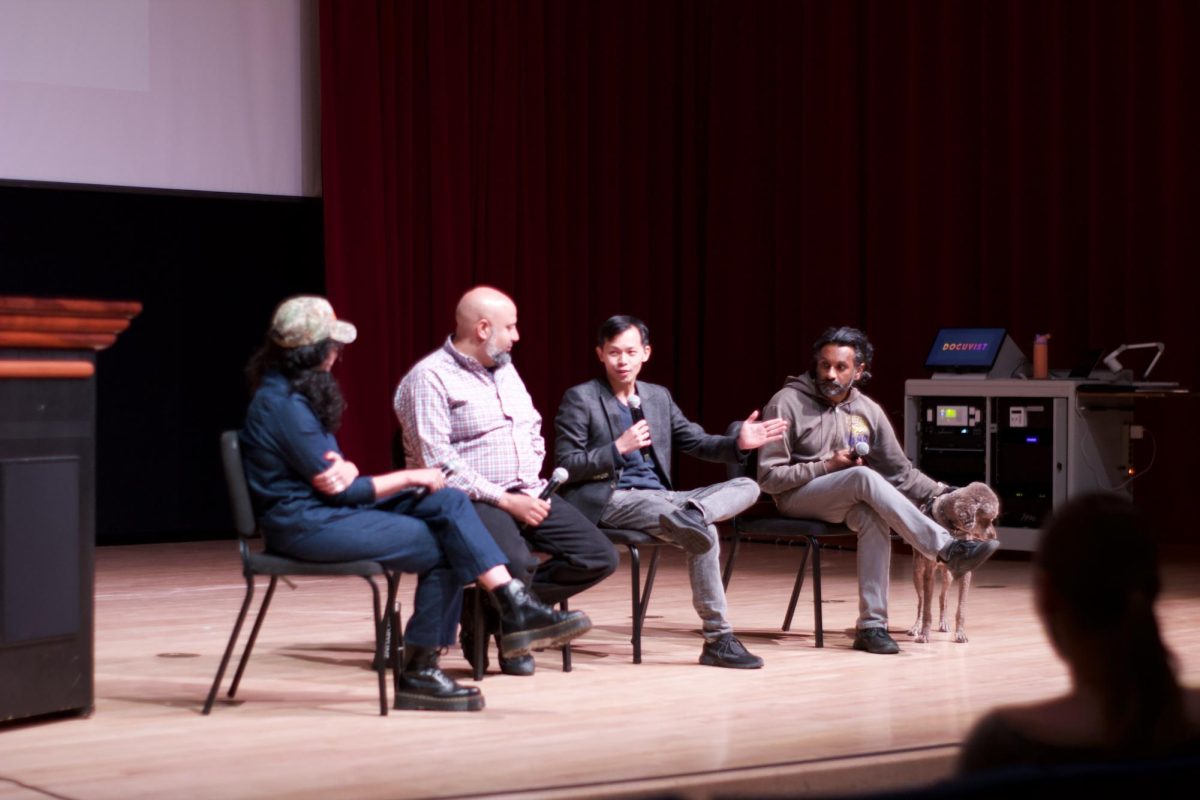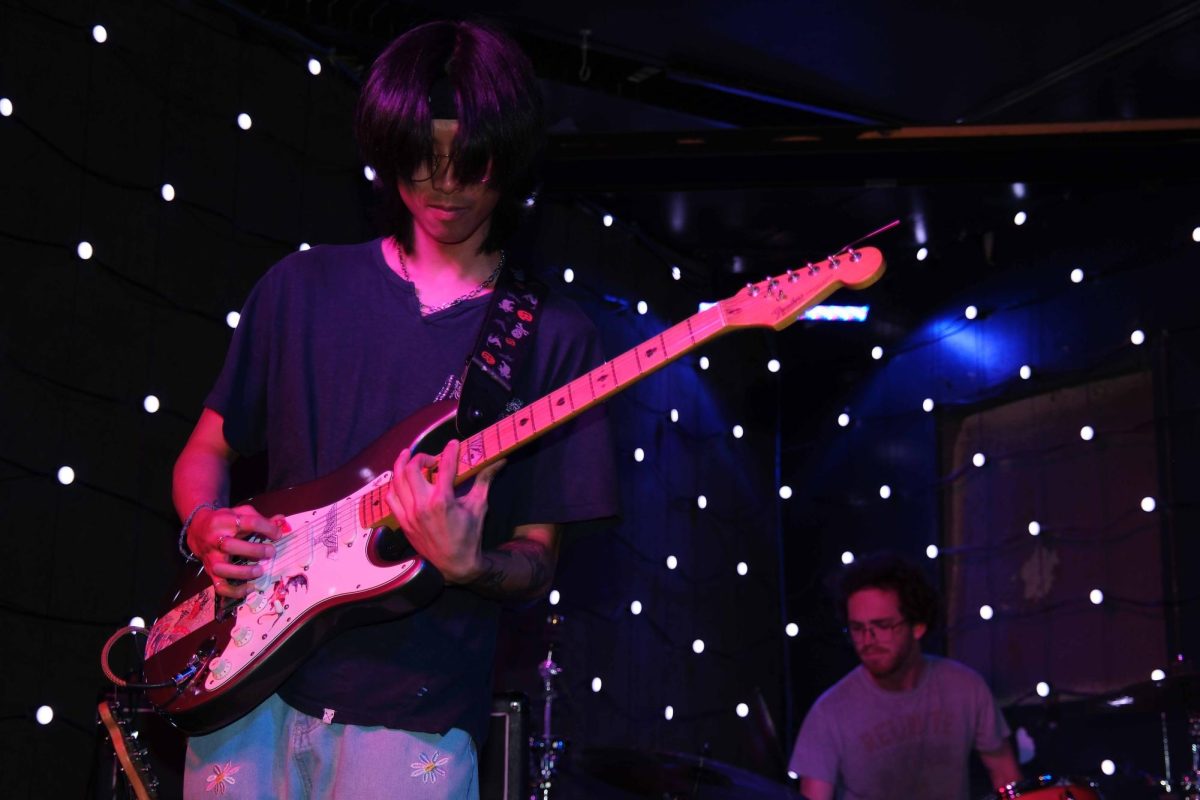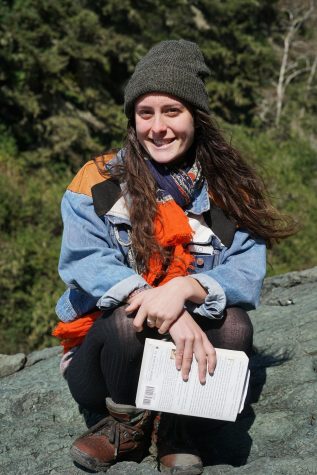Chhoti Maa, or Vreni Michelini-Castillo as her students know her, has been teaching in SF State’s Latina/Latino Studies Department since Spring 2019, but she’s been creating music for much longer.
Her style is a fusion of hip hop and R&B. Chhoti Maa was born in Mexico and as a child, immigrated to the U.S. — first living on the East Coast, then settling in the Bay Area where she studied for her Master of Art practice at UC Berkeley. Her practice has taken her all over the world, including the Middle East and Africa, where she describes being influenced greatly by the sounds of West African music and adhan, the Muslim call to prayer.
In 2018, she was asked by tUnE-yArDs, a Bay Area art-pop band, to appear on the score they composed for the movie “Sorry to Bother You,” which is set in Oakland. She described the experience as one she couldn’t believe but was very grateful for.
In 2021, Chhoti Maa will be releasing her third album, which has been supported by Zoo Labs, a Bay Area non-profit which sponsors artists in their creative endeavors.
Parts of this interview have been condensed for clarity
Q: When did creating music and rapping start for you?
A: I grew up listening to a lot of different types of music from a very young age. I grew up in between like a town in Mexico and then Mexico City. Mexico City is one of the biggest metropolises of the world. So lots of sounds, lots of soundscapes, lots of culture. I think Mexican people— we’re very diverse as well, but we do have a very strong oral tradition.
By the time I was like six, seven, I lived in Mexico City and hip-hop was already big in Mexico. Then when I migrated, when I was around like 12— I didn’t speak English. One of the ways that I learned how to speak English was through watching media. Watching WWF and BET’s 106 & PARK with AJ and Free and listening to hip-hop and r&b.
It wasn’t until around college that I start[ed] to write music in it in and of itself. I was in choir; I like to take little tiny classes here and there. For the most part, I am kind of self-trained like kind of folk artists, although I have had different types of teachers, particularly in the Bay—I was a student of CK Ladzekpo.
Q: What was growing up in Mexico like for you?
A: The town that I come from is a town that was colonized very quickly. It has a very intense and complex history. The family that I come from also has roots there in Guanajuato, but it’s also from Mexico City, multiple generations from the north in Coahuila and then from the south and Guerrero. My roots are broad in Mexico, and that has [placed] me in this really interesting position — learning from very different places and from very different contexts.
My paternal grandmother is the person that I grew up with; she was raised by her grandmother. Her grandmother was a sobadora. She used to heal children and babies with their stomach with traditional Indigenous medicine. She was Purépecha and she passed the knowledge to my grandmother. My father migrated to Mexico; my mom was in school. There were the early years in my early childhood that I was with her before going to Mexico City.
Then after Mexico City, we lived with her again or near with her. Learning about food, how to use plants, and just old stories of the family — all of this very rich information. It really made me understand how important storytelling is.
The education I received was very strong because it’s connected to practices that are thousands of years old. Then migrating and understanding the importance of the word through hip-hop, through R&B— because of blues, because of jazz, because of the very complex history, that African Americans and any Afro-descendants have lived.
Q: Describe what drew you to the Bay Area.
A: The Bay, I feel like it’s a magical — I know that’s a cheesy word, but I think it’s a very magical place. It’s like a little nest. Even just the geographic structure of it, that it’s a bay. I really love the energy. I love the vibe of the city, the culture, the legacy that has been built here, by the Black Panther party, by the AIM [American Indian movement], by the Chicano power movement, API [Asian and Pacific Islander] movements. I think the Bay is really, like I said, a nest for culture and critical thought.
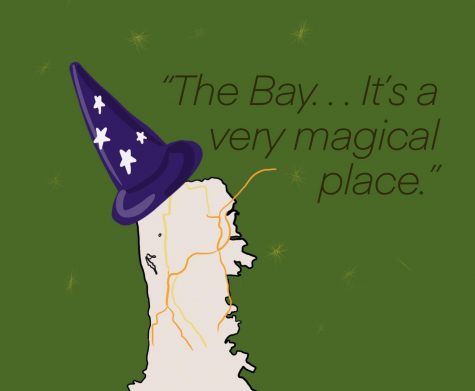
Interestingly enough, different generations of my family have come to the Bay. One of my ancestors, Ignacio Ramirez, was exiled from Mexico and ended up living in San Francisco in the 1850s, 1860s. He was atheist and he was basically a freedom fighter, a poet as well, a teacher and was very much against the Catholic church. At that point, there wasn’t a lot of separation between the state and the church. Also [he] was born in the same state that I’m from, Guanajuato.
Q: Who were some of your teachers or artists who influenced you?
A: CK Ladzekpo who’s a very important Ghanian musician of traditional Ewe music of the Indigenous people. He’s a professor at UC Berkeley and he’s also one of the leading musicians at East Bay Center for the Performing Arts in Richmond where I used to work. He oriented me musically.
My other teacher is Chicueyi Coatl and she’s my Danza teacher, Danza Mexica. She also really taught me a lot through movement. Both of these teachers taught through movement but also through music. With Chicueyi Coatl I learned some of the basics of Danza and also basics of playing the Huehuetl— our traditional drum.
Another teacher from UC Berkeley was Anthony Dubovsky. He taught a class that was called “Song in Place” where he just focused on Mexican songs from the thirties, forties, and fifties. That’s what I grew up on with my grandma. We just would sing for hours and hours and it was phenomenal.
Q: What kinds of music are you listening to now?
A: Since 2012 I’ve been listening to a lot of Afro-fusion, Afro-beat, Afro-pop, Kwaito music.
One of my really good friends, Mirza Zeher, they started making a mix of electronic, but sampling old Bollywood and Punjabi music. I love Cumbia. Another one of my friends released an album recently, Diogahndih. So I’ve been listening to their project too.
African polyrhythm I think is so important because CK Ladzekpo say[s] it teaches you how to deal with life. Life is not always going to be one, two, three, four, one. It’s not always going to have that count. It’s going to have all these rhythms and things that at times you don’t know how to handle. I think that type of music really kind of prepares the brain for the way that life flows.
Q: What musicians have you collaborated with?
A: beto guapoflaco, who is one of my best friends and then Keith Avelino Hernandez. We’ve been producing and making music together for eight years. We also met through Berkeley— that changed my whole career. Prior to that, I was producing things by myself. Then in meeting them, I really found a home.
[We’ve developed] incredible chemistry together, musically, and that’s very difficult to find. It’s like a good relationship or a good friendship, or like even a good cup of coffee. You won’t find that everywhere. Right now we’re working on our third album together. We made Agua Corre in 2016 but we started working on it in 2012, so it took many years.

Q: Describe a bit more about the third album and how your first and second led up to it.
A: I had Agua Corre on my belt and then Caldo de Hueso really helped me understand my direction musically. Now I did an accelerator program or residency through Zoo Labs, which is in West Oakland. We just recorded it in November. We’re going to release it later on this year.
The album is called Flor del Bajio, it means flower of the Bajio. The Bajio is the region that I’m from in Mexico. In this album I was able to call on the same collaborators that I brought on in Caldo de Hueso, which were people that I met in the Bay.
Q: What do you want to pass on through your music?
A: I think it’s a reflection of my life, of the times that I’m living in. The legacy of my ancestors through me, because without them, I wouldn’t be here. I try to really honor that and all the multiplicities of my identity.
My music, it’s trans genres and is in multiple languages. In the last project, I’ve really tried to incorporate more people, refine it, really bring the musicianship in and really pay attention to every single detail. They’re definitely like prayers. It’s definitely political analysis. I’m passing down ecological knowledge and I’m also passing down traditional medicine and advice, embodied, lived experience.
Chhoti Maa can be found on Instagram, Spotify and Youtube. Her personal website can be found here.




